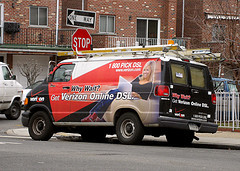Lawsuit: Verizon Sold Me A DSL Plan It Couldn't Deliver
A Verizon customer in California says the telecom titan screwed her over by selling her on a higher-priced DSL tier that it should have known could never possibly deliver the promised speeds.
In a lawsuit recently filed against Big V in an L.A.-based state court, the customer says Verizon convinced her to upgrade from her current $24.99/month plan to a $34.99/month plan that promised speeds at up to 1.5 Mb/second.
But after noticing that her downloads were coming in at a maximum of half that speed, she says she contacted Verizon. This time, she claims a tech told her that she would never be able to see that 1.5 Mb speed because her home is more than two miles away from her nearest Verizon service center.
The plaintiff says the tech told her she should only have signed up for a 768k/second plan because that was she best she’d ever be able to get given her distance from the source and the limitations of DSL.
When she pressed Verizon for a refund for the time she’d been on the higher-priced plan, the phone company said no.
The plaintiff isn’t just suing on her own behalf but is seeking class-action status to cover “all persons and entities in California who are located a certain distance” from a Verizon center.
A rep for Verizon tells PaidContent.org that, “We believe the lawsuit is baseless and without merit.”
Last summer, the FCC released the results of a nationwide study of major cable-internet and DSL providers to see which companies were delivering the speeds they advertise.
While Verizon FiOS delivered — and often over-delivered — on promised download speeds, none of the company’s DSL tiers were able to sustain advertised download speeds. However, both the 1.5 Mb and 770k tiers had around 80% of their advertised speeds, meaning that even at the lower tier, the customer could be getting less than they hope.
Woman sues Verizon for lying about Internet speed [PaidContent.org]
Want more consumer news? Visit our parent organization, Consumer Reports, for the latest on scams, recalls, and other consumer issues.


